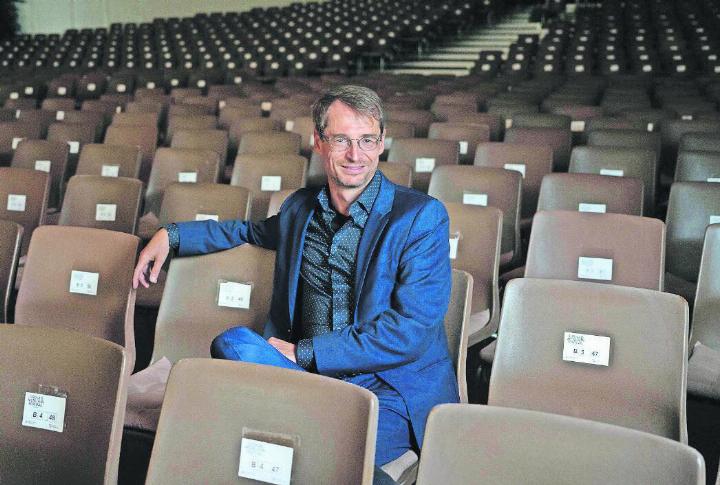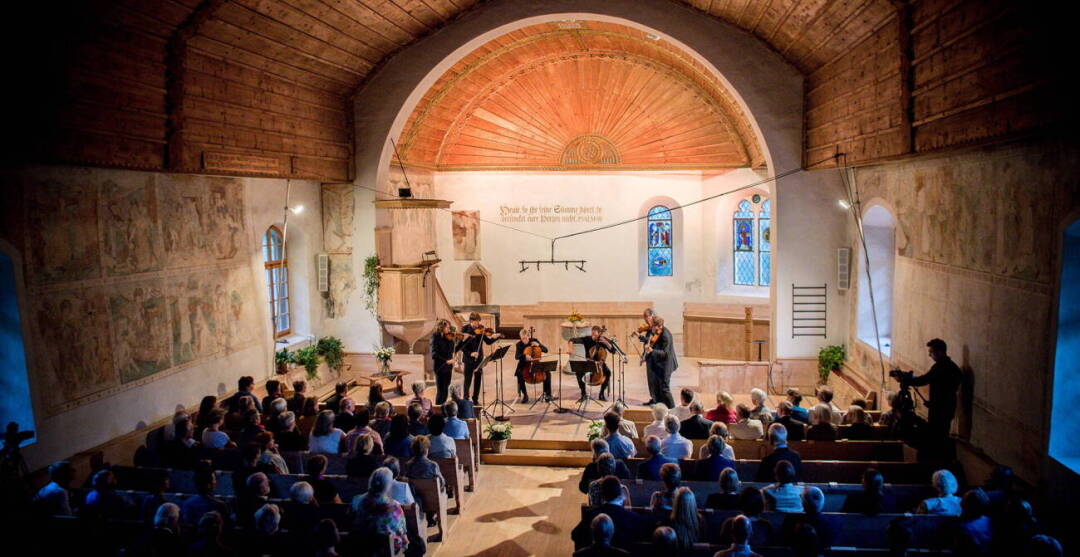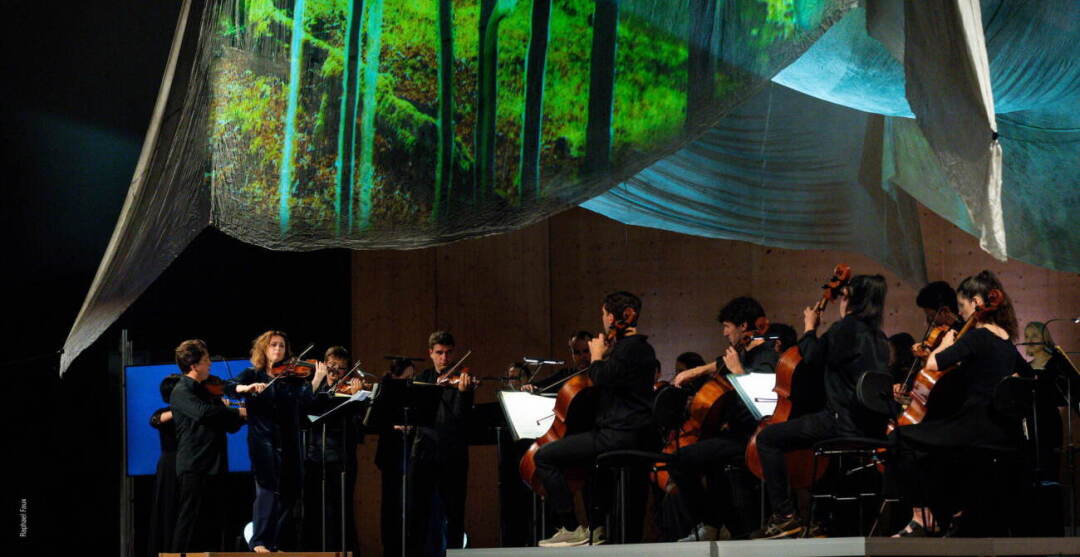The first cycle of change
08.09.2023 Arts & Culture, Menuhin Festival & Academy, Concerts, Events, ProfileAs the echoes of the last notes from this year’s Gstaad Menuhin Festival & Academy fade away, Artistic Director Christoph Müller offers his insights into the 2023 edition and provides an enticing glimpse of what awaits attendees in the festival’s 2024 instalment.
Music on its own might not change the world, but it can definitely contribute to it", he said on launching the ambitious program cycle called CHANGE.
Mr. Müller, how satisfied are you with this year's Menuhin Festival?
Very satisfied. We had about nine per cent more visitors than in 2022 and can speak of a successful year. At the end of the festival one is always tired, but very grateful for everything. I am enormously pleased that nearly 26,800 people attended all our events and that we can thus build on the record year of 2018. It is interesting to note that the attendance at our Academy concerts is growing steadily, which speaks for a great curiosity on the part of the audience.
I must also say that I took some risks for this year. For example, in deciding to switch from rather light festival themes to those that have more relevance to our times. Or also with regard to the choice of the "Artist in Residence", Francesco Piemontesi, who played four concerts: He is an enormously subtle, fantastic pianist from Ticino who is making a world career. But he is not a "star" in that sense. His concerts were very well received, and the critics agreed that his concerts were stellar moments.
What mishaps or unforeseen events (such as artists falling ill) did you have to deal with this year? And how did you solve them?
With over 60 events, it is normal that there are changes at short notice from time to time. We had very few cancellations this year, but of course it's a shame that we couldn't meet soprano Pretty Yende due to a death in the family. It is also regrettable that pianist Alice Sara Ott could not play and that violinist Patricia Kopatchinskaja fell ill before her last concert. Fortunately, we were still able to perform the concerts and the audience accepted the changes for the most part.
What was your personal highlight, and why this one in particular?
I have a special emotional and human connection with the Gstaad Festival Orchestra. What this ad hoc orchestra, which has been playing almost unchanged at the part-leader positions for almost ten years, achieved with its concerts this year was world-class! This is largely due to conductor Jaap van Zweden, who energetically demands quality, emotion and energy from the musicians and gets it. This Mahler 2 (Resurrection Symphony) or Shostakovich's Ninth, which we fortunately recorded for the Gstaad Digital Festival, will remain in my memory for the rest of my life.
The GFO proved that it can also do opera with the impressive performance of Puccini's "Tosca" conducted by Domingo Hindoyan. This production culminated in a follow-up performance in the Festspielhaus Baden-Baden, which was sold out with 2500 visitors and brought a lot of attention to our festival and Gstaad.
Looking back: What should have been done differently, or at best better, and why?
For two of the four concerts with Patricia Kopatchinskaja as part of "Music for the Planet", "Les Adieux" and "Forelle", perhaps it should have been explained better in advance or emphasised more clearly what it was about. The panel discussion on 5 August with exponents of science and the climate movement as well as Kopatchinskaja was actually not a discussion but a string of statements - but very exciting and important statements, which we will also publish on our digital platform in the coming weeks, as they are meaningful for our entire cycle.
How have you dealt with the controversial reactions to the new festival content such as Music for the Planet?
I am grateful that the two projects, "Les Adieux" and "Forelle" in particular, have triggered discussions. I realise that the subject of the drama of rapidly accelerating climate change is sometimes a generational issue. I have seen 20-year-olds at the concerts who were close to tears because they felt addressed by a topic that moves them every day. Others could only make little sense of the whole thing.
It is impressive that such opposing emotions can be triggered with such intensity, even in the context of music. I expected criticism, and that's a good thing. Every criticism shows that the concerts have an effect. One should not close one's eyes to reality and in my eyes it is legitimate that this moving reality is also taken up in cultural projects at times - that is what culture is there for! And at the same time I understand all those who want to experience culture as a pleasure - that is still possible at the majority of our events - and it should be! Our festival stands for top-class music combined with enjoyment in unique surroundings. We are not changing anything about this successful formula.
How satisfied are you with the academies and their contributions?
The Gstaad Conducting Academy in particular is receiving more and more international attention because it is so unique in Europe. It has now become a showcase for major agencies and symphony orchestras from all over the world. The first Piano Academy with Maria João Pires and the String and Baroque Academy were also remarkable in terms of content and the level of the participants.
The two amateur orchestra weeks for young people and adults with their final concerts in the tent are a big hit. Including the amateurs, we had about 250 active participants who spent between seven and 21 days in Saanenland. The number of visitors to the Academy concerts also continues to rise, which makes us very happy because these formats are still being developed.
What were you most annoyed about this year?
Not annoyed, but sometimes ideas or plans that one wishes for or imagines cannot be realised for whatever reason. Mostly, however, because artists are not free as planned or want to do completely different programmes than one had planned in the long term in a big context. However, this mainly concerns the upcoming festival editions in 2024 and 2025, some of which are still "construction sites" ... but that is quite normal in the process of planning a festival. Plans are made, only to be overturned again afterwards. So it's all the nicer when a festival can be presented in its entirety in December.
What do you want to tell your festival visitors (or in general) at this point?
The 2024 edition is about "transformation," and we have arrived at the second year of our three-year cycle of change. The programme will be published shortly before Christmas 2023. Transformative aspects in music on different levels will play a role, and musicians such as violinist Julia Fischer or pianist Hélène Grimaud, for example, will present promising programmes. We are very much looking forward to this!
Based on AvS | Text and Photo of Mr Müller by KEREM S. MAURER / Concert photos: RAPHAEL FAUX
"TRANSFORMATION"
12 July – 31 August 2024
Read more here








